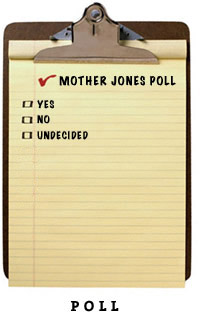
Voters remain deadlocked in a partisan divide over which candidate to support, but this split is not indicative of the bipartisan discontent felt by most Americans, a new national poll by Mother Jones reveals
In line with other national surveys, the Mother Jones poll shows President George W. Bush and Senator John Kerry locked in a statistical dead heat, with Ralph Nader supported by five percent of registered voters. But the Mother Jones poll probed deeper than approval ratings and tracking questions, asking respondents if their own lives had improved on more than a dozen fronts since Bush took office. The poll also asked voters to identify who they saw as the “winners” and “losers” of the last three years.
Change Wanted
The results indicate a startling consensus on the need for change. Asked if the country should “continue in the same direction as the one Bush is headed or a significantly different one,” 57 percent of Americans at large, 57 percent of swing state voters, and 67 percent of independents said they want a different course. Although the vast majority of Republicans remain loyal to Bush — nearly 90 percent say they would support the president over Kerry — the poll found that 34 percent of moderate Republicans, as well as 24 percent of those who voted for Bush in 2000, now want a change of direction for the country.
A majority of registered voters from across the political spectrum, including many of the President’s core voters, said they believe the poor, the middle class, and American workers have lost ground over the past three years, while the wealthy, big corporations, and CEO’s have gained.
Perhaps most importantly, independent voters — a group that regularly affects the outcome of presidential elections — appear to be distancing themselves from President Bush’s conservative Republican base on a wide range of issues. “Their underlying dispositions right now look like they seem to favor Kerry,” says Kathleen Hall Jamieson, director of the Annenberg Public Policy Center.
Iraq
The discontent divide is particularly acute on Iraq. Despite the removal of Saddam Hussein, only 39 percent of all respondents identified the Iraqi people as having gained ground over the last three years. The war is the leading concern for Democrats and independent voters alike (44 and 34 percent, respectively), while Republicans cite the state of America’s moral values as the most pressing issue (32 percent). Similarly, when asked to choose between two statements on the Iraq war — “The Iraq war is a good investment in our security” and “The Iraq war is making it harder to meet our needs at home” — a large majority of Democrats and independents said the latter assessment best matched their own.
Even among Republicans, support for the war is less solid than it may first appear. While 60 percent of all Republicans have positive feelings about the war, only 45 percent of liberal and moderate Republicans say the same. Less than half of moderate Republicans said the war has been a wise investment in our national security. And only 51 percent of moderate Republicans see the Iraqi people as coming out of the last three years as “winners.”
The Economy
On the economic front, a significant majority of all respondents said both they and the nation at large were worse off in regards to job security, the availability of good-paying jobs, the gap between wages and expenses, and access to health care.
Despite three massive tax cuts championed by the president, only 29 percent of all respondents said their tax burden was better. And while nearly 60 percent of conservative Republicans said their tax situation had improved, only 38 percent of moderate and liberal Republicans agreed, a number more in line with liberal Democrats (17 percent), conservative Democrats (14 percent), and independents (16 percent).
Furthermore, while 60 percent of conservative Republicans said the middle class has gained under Bush, only 41 percent of more moderate Republicans share that view. Finally, like Democrats and independents, three quarters of moderate Republicans said big corporations have emerged as winners thanks to Bush.
“This is the most dramatic evidence I have seen that the public perceives a Bush administration tilt towards the wealthy and away from middle and lower income Americans,” said Benjamin Page, a political scientist at Northwestern University. “If that were true on election day, Bush would be in deep trouble.”
The Bush Base
The only people who seem uniformly pleased with the direction of the country are conservative Republicans and devout evangelical Christians, for whom the war remains largely popular, and in whose eyes Iraqis have gained ground. There is significant crossover between the two groups, and evangelicals remain the most committed element of Bush’s support: More than 75 percent have warm feelings toward him, versus 25 percent for Kerry.
Nearly three-quarters of devout evangelicals believe that Bush has lived up to his promise to govern as a compassionate conservative — a view held by only 42 percent of all respondents — and two-thirds of evangelicals say they are confident their children will have a chance to lead a better life than their own, something less than half of all respondents believe.
But Can Kerry Swing?
It is far too early to tell whether the broad public dissatisfaction seen in the poll will hurt Bush come Election Day. There seems to be real disagreement between conservative and more moderate Republicans, but thus far Kerry has failed to capitalize on the GOP split. While only 59 percent of Republican voters said they strongly support the direction the president has chosen, only 10 percent of Republicans who do not now support Kerry said there was a chance that they would change their mind and vote for him. Among independent voters not committed to Kerry, 19 percent said there was a fair or small chance that they would vote for him.
“Even if you grant that the right track/wrong track numbers aren’t in the President’s favor right now, Senator Kerry hasn’t shown that he is the leader to take the country on the right track,” says Republican pollster Jon McHenry. Kerry officials, meanwhile, see the poll results as cause for optimism. “The president is the best-known politician in the land. It takes time for people to learn who John Kerry is,” says Mark Mellman, a pollster for the Kerry campaign, who contends that recent poll numbers could be disastrous for the president. Kerry could further benefit if his campaign can convince more Americans to vote. While the president and Kerry are essentially tied among likely voters, Kerry holds a 14-point edge among respondents who said they were registered, but unlikely to vote.
The widespread dissatisfaction with the nation’s direction reflects the findings of several other recent surveys. A May poll by the Pew Research Center for the People and the Press found 61 percent of voters dissatisfied with the nation’s direction, an increase from just 47 percent last December, and a Los Angeles Times poll conducted last week found three-fifths of Americans believe the nation is on the wrong track.
“No president has ever been reelected with that many people thinking the country is moving in the wrong direction,” said Mellman, Kerry’s pollster. Bush supporters may take some solace from the fact that Bill Clinton’s approval ratings were just as bad in July 1996, and he went on to win by a landslide.
The difference, however, is that Clinton’s poll numbers were already on an upswing and continued to rise as the economy improved and dissatisfaction with his early policies faded. By contrast, Bush’s popularity has been declining along with support for the invasion of Iraq, and despite signs that the economy is picking up speed. Supporters of Senator Kerry hope that this trend continues through election day.
















